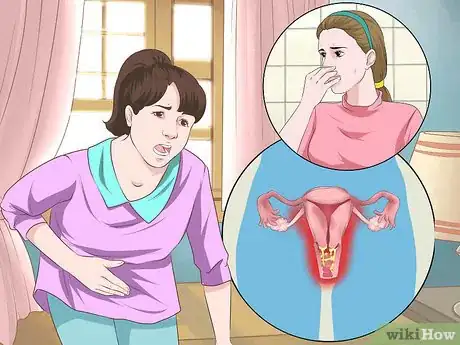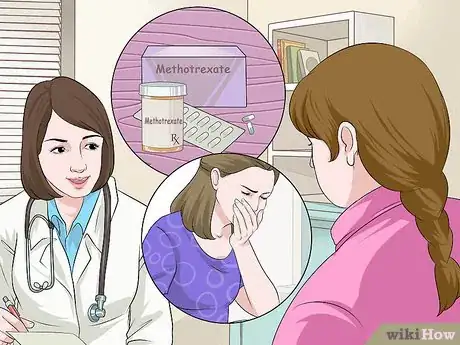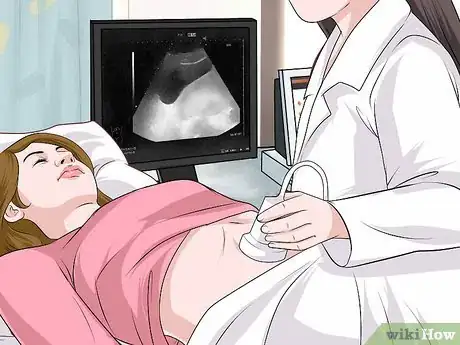This article was co-authored by Carrie Noriega, MD. Dr. Noriega is a Board Certified Obstetrician & Gynecologist and medical writer in Colorado. She specializes in women’s health, rheumatology, pulmonology, infectious disease, and gastroenterology. She received her MD from the Creighton School of Medicine in Omaha, Nebraska and completed her residency at the University of Missouri - Kansas City in 2005.
There are 10 references cited in this article, which can be found at the bottom of the page.
wikiHow marks an article as reader-approved once it receives enough positive feedback. In this case, 87% of readers who voted found the article helpful, earning it our reader-approved status.
This article has been viewed 86,183 times.
An ectopic pregnancy occurs when a fertilized egg implants in a location outside of the uterus, most commonly in one of the fallopian tubes. This kind of pregnancy cannot proceed normally, and can cause serious complications if left untreated for too long. There is not much you can do to avoid having an ectopic pregnancy, but there are a few ways to reduce your risk factors. If you have an ectopic pregnancy, getting the right medical treatment can reduce your risk of complications.[1]
Things You Should Know
- The odds of an ectopic pregnancy in the general population are around 1%, but once you’ve had an ectopic pregnancy that shoots up to 10-15% for all future pregnancies.
- You can minimize your risk of an ectopic pregnancy by avoiding STIs, using condoms, and not smoking.
- Roughly 50% of women have zero risk factors at the time of the ectopic pregnancy, so don’t assume that you did anything wrong if you have an ectopic pregnancy—it can happen to anyone.
- Outside of not getting pregnant, there is no way to 100% prevent an ectopic pregnancy, so use birth control if you aren’t actively trying to conceive.
- If an ectopic pregnancy ruptures, the symptoms and consequences can be potentially life-threatening; it’s an emergency condition and you must seek medical care if you suspect you’re having an ectopic pregnancy.
Steps
Reducing Your Risk Factors
-
1Reduce your risk of sexually transmitted infections. Sexually transmitted infections (STIs) such as gonorrhea or chlamydia may increase a woman's chances of having an ectopic pregnancy. If you reduce your risk of contracting one of these diseases, you may reduce your risk of having an ectopic pregnancy as well.[2]
- Limit your number of sexual partners in order to reduce your risk of exposure.
- Always use a condom during sex to reduce your risk of contracting a disease.
-
2Get quick treatment for infections. If you do get an STI, it's important to get treatment right away. The sooner you are treated, the less likely you are to develop inflammation that may damage your reproductive system and increase your risk of developing ectopic pregnancies.[3]
- Common symptoms of STIs include abdominal pain, painful urination, vaginal discharge, abnormal vaginal bleeding, vaginal odor, and pain during sex.[4]
- Some infections are asymptomatic. It's a good idea to get tested regularly if you are sexually active.
Advertisement -
3Quit smoking. Smoking may increase your risk of having an ectopic pregnancy. Quit smoking before you try to conceive in order to reduce your risk.[5]
- The more you smoke, the higher your risk of having an ectopic pregnancy will be, so if you can't quit, even reducing the number of cigarettes you smoke may be beneficial.
-
4Understand the other risk factors. There are many other factors that may put you at a higher than average risk for developing an ectopic pregnancy. If any of the following risk factors apply to you, it is especially important that you see a doctor as soon as you have reason to believe you are pregnant, as you will not be able to distinguish a normal pregnancy from an ectopic pregnancy by using an at-home pregnancy test: [6]
- Women who have had a previous ectopic pregnancy
- Women who get pregnant while they have an IUD or after having a tubal ligation procedure (both of which are very rare)
- Women who have structural abnormalities of the fallopian tubes
- Women who have struggled with fertility problems, especially women treated with assisted reproduction technologies (IVF, ART, etc.)
- Women who were exposed to the chemical DES (diethylstilbestrol) before birth (DES was last used in 1971, so this is becoming less common)[7]
Reducing Your Risk of Complications and Future Ectopic Pregnancies
-
1Get treatment for symptoms of an ectopic pregnancy. It's important to get medical treatment for an ectopic pregnancy right away. The sooner you get treatment, the lower your risks will be of developing severe complications.[8]
- Common symptoms of an ectopic pregnancy include missing periods, pain in the low back and abdomen (can be on the right or left side), cramping, abnormal vaginal bleeding.
- If your ectopic pregnancy ruptures, you may experience symptoms such as severe abdominal pain, shoulder pain, low blood pressure, faintness, and pressure in the rectum. This is an emergency situation that requires immediate medical care.
- Early symptoms of ectopic pregnancy may be the same as the symptoms of a normal pregnancy, so it's important to see your doctor early to ensure that your pregnancy is developing normally.
-
2Opt for medicine instead of surgery if possible. If you develop an ectopic pregnancy, you will need to either take medication or have surgery to remove the pregnancy. If medication is an option for you, it may be preferable, as it is less likely to cause damage to the fallopian tubes, which can further increase your risk of having another ectopic pregnancy in the future.[9]
- Medication is usually only an option if the ectopic pregnancy is detected early. The medication used to stop cell growth is called methotrexate. If methotrexate is used, the patient will be required to follow up regularly for blood tests and close observation, so you must be able to commit to returning for follow up appointments.
- Methotrexate can cause side effects, including indigestion, diarrhea, and nausea.
- If you were given methotrexate, use birth control to avoid becoming pregnant again for at least three months. Exposure to methotrexate may harm your unborn child.[10]
- Surgery is sometimes the best option, so always listen to your doctor's advice. Surgery is done laparoscopically (through tiny incisions) and only rarely through a laparotomy (large incision).
-
3Report persistent abdominal pain. If you have abdominal pain that does not subside after you are treated for an ectopic pregnancy, tell your doctor about it right away. This may be a sign of an infection, which could continue to increase your risk of having ectopic pregnancies if it is not treated.[11]
-
4Have future pregnancies monitored early. While there's not much you can to prevent another ectopic pregnancy, you can prevent a future ectopic pregnancy from causing serious complications. If you have had an ectopic pregnancy in the past, you should see your doctor for blood tests and ultrasounds as soon as you think you are pregnant again. This can help confirm early on whether your pregnancy is normal.[12]
- Most women who have ectopic pregnancies go on to have normal pregnancies, so don't give up hope.
References
- ↑ http://www.mayoclinic.org/diseases-conditions/ectopic-pregnancy/basics/definition/con-20024262
- ↑ http://www.mayoclinic.org/diseases-conditions/ectopic-pregnancy/basics/prevention/con-20024262
- ↑ https://www.nlm.nih.gov/medlineplus/ency/article/000895.htm
- ↑ http://www.mayoclinic.org/std-symptoms/art-20047081
- ↑ http://www.mayoclinic.org/diseases-conditions/ectopic-pregnancy/basics/prevention/con-20024262
- ↑ http://www.mayoclinic.org/diseases-conditions/ectopic-pregnancy/basics/risk-factors/con-20024262
- ↑ http://www.webmd.com/baby/tc/ectopic-pregnancy-getting-pregnant-again-topic-overview
- ↑ https://www.nlm.nih.gov/medlineplus/ency/article/000895.htm
- ↑ http://www.webmd.com/baby/tc/ectopic-pregnancy-medications







































































Medical Disclaimer
The content of this article is not intended to be a substitute for professional medical advice, examination, diagnosis, or treatment. You should always contact your doctor or other qualified healthcare professional before starting, changing, or stopping any kind of health treatment.
Read More...